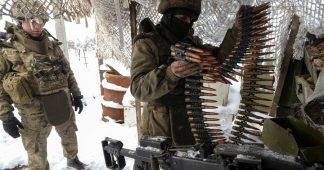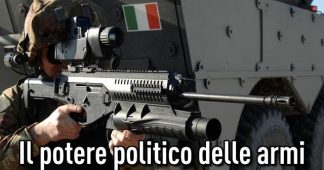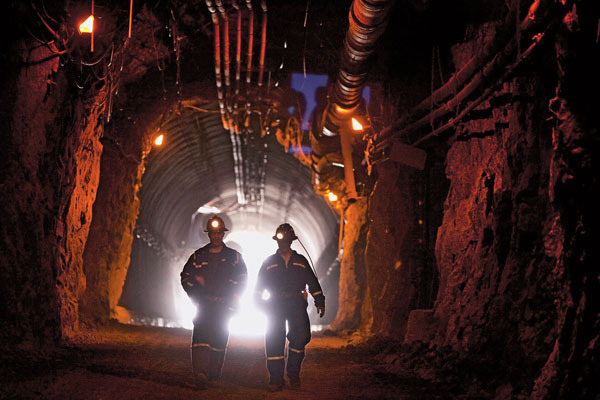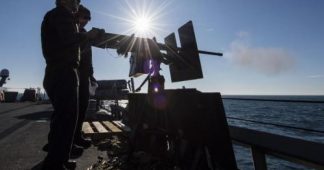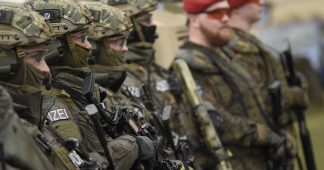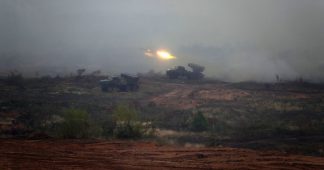By Posted on
Last week Anju Dhillon told the House of Commons “I saw firsthand the sacrifices that our men and women in the navy have made to protect our country.” The Liberal MP recently participated in the Canadian Leaders at Sea Program, which takes influential individuals on “action-packed” multi-day navy operations. Conducted on both coasts numerous times annually, nine Parliamentarians from all parties participated in a Spring 2017 excursion and a number more joined at the end of last year. The Commander of the Atlantic Fleet, Commodore Craig Baines, describes the initiative’s political objective: “By exposing them to the work of our men and women at sea, they gain a newfound appreciation for how the RCN protects and defends Canada at home and abroad. They can then help us spread that message to Canadians when they return home.”
And vote for more military spending.
MPs are also drawn into the military’s orbit in a variety of other ways. Set up by DND’s Director of External Communications and Public Relations in 2000, the Canadian Forces Parliamentary Program was labeled a “valuable public-relations tool” by the Globe and Mail. Different programs embed MPs in the army, navy and air force. According to the Canadian Parliamentary Review, the MPs “learn how the equipment works, they train with the troops, and they deploy with their units on operations. Parliamentarians are integrated into the unit by wearing the same uniform, living on bases, eating in messes, using CF facilities and equipment.” As part of the program, the military even flew MPs to the Persian Gulf to join a naval vessel on patrol.
The NATO Parliamentary Association is another militarist lobby in the nation’s capital. Established in 1955, the association seeks “to increase knowledge of the concerns of the NATO Parliamentary Assembly among parliamentarians.” In The Blaikie Report: An Insider’s Look at Faith and Politics long time NDP external and defense critic Bill Blaikie describes how a presentation at a NATO meeting convinced him to support the organization’s bombing of the former Yugoslavia.
Military officials regularly brief members of parliament. Additionally, a slew of “arms-length” military organizations/think tanks I detail in A Propaganda System: How Canada’s Government, Corporations, Media and Academia Sell War and Exploitation speak at defense and international affairs committees.
More politically dependent than almost all other industries, arms manufacturers play for keeps in the nation’s capital. They target ads and events sponsorships at decision makers while hiring insiders and military stars to lobby on their behalf.
Arms sellers’ foremost concern in Ottawa is accessing contracts. But, they also push to increase Canadian Forces funding, ties to the US military and government support for arms exports, as well as resisting arms control measures.
In a recent “12-Month Lobbying Activity Search” of the Office of the Commissioner of Lobbying of Canada the names of Lockheed Martin, CAE, Bombardier, General Dynamics, Raytheon, BAE, Boeing and Airbus Defence were listed dozens of times. To facilitate access to government officials, international arms makers Lockheed Martin, Boeing, Northrop Grumman, BAE, General Dynamics, L-3 Communications, Airbus, United Technologies, Rayethon, etc. all have offices in Ottawa (most are blocks from parliament).
The Canadian Association of Defence and Security Industries is the primary industry lobby group. Representing over 900 corporations, CADSI has two-dozen staff. With an office near parliament, CADSI lobbyists focus on industry-wide political concerns. The association’s 2016 report described: “an intense engagement plan that included hundreds of engagements with targeted decision makers, half of which were with Members of Parliament, key ministers and their staffs, including the Prime Minister’s Office. From one-on-one meetings, to roundtables, to parliamentary committee appearances, to our first ever reception on Parliament Hill, we took every opportunity to ensure the government understood our industries and heard our message.”
CADSI organizes regular events in Ottawa, which often include the participation of government agencies. The CANSEC arms bazaar is the largest event CADSI organizes in the nation’s capital. For more than two decades the annual conference has brought together representatives of arms companies, DND, CF, as well as the Canadian Commercial Corporation, Defence Research and Development Canada, Innovation, Science and Economic Development Canada, Public Services and Government Services Canada, Trade Commissioner Service and dozens of foreign governments. In 2017 more than 11,000 people attended the two-day conference, including 14 MPs, senators and cabinet ministers, and many generals and admirals. The minister of defence often speaks at the 600-booth exhibit.
The sad fact is enormous profits flow to a few from warfare. In a system where money talks, militarists on Parliament Hill will always be among the loudest voices.
To rise above their din, we need to figure out ways to amplify the sound of the millions of Canadians who prefer peace.
* A Canucks and Canadiens fan, Yves Engler confesses to having hated the Leafs before they partnered with the navy. He is the author of Playing Left Wing: From Rink Rat to Student Radical and other books. He is currently writing a people’s history of the Canadian military.
